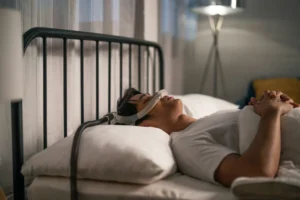What are the disadvantages of oral appliances for sleep apnea?
Sleep apnea is a common sleep disorder that affects many people worldwide. If left untreated, it can lead to serious health complications. But what are the disadvantages of oral appliances for sleep apnea?
One of the treatment options for sleep apnea is the use of oral appliances. These devices are often recommended as an alternative to Continuous Positive Airway Pressure (CPAP) machines.

However, like any treatment, oral appliances have disadvantages. Understanding these drawbacks is crucial for anyone considering this option.
This article will explore the disadvantages of using oral appliances for sleep apnea. We aim to provide a comprehensive overview to help you make an informed decision about your health.
This guide will benefit sleep apnea patients, family members, and those exploring CPAP alternatives.
Stay with us as we explore the potential downsides of using dental appliances for sleep apnea treatment.
Understanding Oral Appliances for Sleep Apnea
Oral appliances for sleep apnea are custom-made devices that fit inside the mouth, similar to sports mouthguards. They work by repositioning the lower jaw and tongue forward to keep the airway open during sleep.
While they are a popular alternative to CPAP machines, oral appliances have drawbacks. These disadvantages range from discomfort and pain to potential dental shifts and hygiene challenges. Let's delve into these issues in more detail.
Common Discomforts and Pain
One of the most common complaints about oral appliances is discomfort, especially during initial use. The device may feel foreign in the mouth, leading to a sense of unease or even pain.
Over time, some users may adjust to the sensation, but others continue to experience discomfort. This can make it difficult to tolerate the device throughout the night, affecting sleep quality.
Potential for TMJ Issues and Dental Shifts
Oral appliances reposition the jaw and tongue to keep the airway open. This can sometimes lead to temporomandibular joint (TMJ) issues or exacerbate pre-existing TMJ disorders.
Additionally, long-term use of these devices may cause dental shifting or changes in bite. This can lead to further discomfort and may require additional dental work.
Oral Hygiene and Maintenance Challenges
Oral appliances require regular cleaning to prevent infections or oral hygiene issues. This can be time-consuming and may be a deterrent for some users.
Additionally, these devices can cause dry mouth or excessive salivation. If not properly managed, these side effects can lead to oral health problems.
Effectiveness Compared to CPAP Therapy
Oral appliances may not be as effective as CPAP machines for severe cases of sleep apnea. They also do not provide the same level of data tracking for sleep therapy management.
Moreover, oral appliances' efficacy can be influenced by the user's weight and sleeping position, so their effectiveness can vary significantly from person to person.
Cost and Insurance Coverage Concerns
The cost of oral appliances can be a significant disadvantage for many users. A dentist's need for periodic adjustments can add to the overall cost.
Insurance coverage for oral appliances can vary, potentially leading to higher out-of-pocket costs. Before deciding on this treatment option, it's essential to check with your insurance provider.
Suitability for Severe Sleep Apnea Cases
Oral appliances may not be as effective for severe cases of sleep apnea as CPAP therapy. This is because they work by repositioning the jaw and tongue, which may not be sufficient for severe obstructions.
Furthermore, oral appliances may not be recommended for patients with central sleep apnea. This type of sleep apnea is caused by the brain failing to send signals to the muscles that control breathing, a problem that oral appliances cannot address.
Adjustments, Fittings, and Long-Term Use
Oral appliances require professional fitting and customization, making the initial process time-consuming. They also need periodic adjustments by a dentist, adding to the overall cost and time commitment.
Long-term compliance rates for oral appliances may be lower than expected. Some users find it difficult to tolerate the device throughout the night, and others may struggle with the commitment to consistent use, which is necessary for the appliance to be practical.
Lifestyle Considerations and Limitations
Oral appliances can be less convenient for travel than compact CPAP alternatives. They may also be less discreet, which could concern some users. Additionally, the devices can cause noise during sleep, potentially disrupting bed partners' sleep.
The efficacy of oral appliances can be influenced by the user's weight, sleeping position, and lifestyle habits. For instance, they can be less effective if the user consumes alcohol or sedatives before sleep. They may also not be suitable for individuals with a high body mass index (BMI).
Conclusion: Weighing the Pros and Cons
In conclusion, while oral appliances offer a viable alternative to CPAP therapy for some, they come with their own set of disadvantages. It's crucial to weigh these drawbacks against the potential benefits and consult with a healthcare professional before deciding on sleep apnea treatment.
Here at Houston Sleep Associates (HSA) in Houston, TX, we are passionate about quality sleep. Our years of experience ensure that each patient receives the best care customized to their unique needs and desires!
SCHEDULE A CONSULTATION IN HOUSTON, TEXAS
See what we offer if you've ever thought about improving your sleep. Schedule a consultation and experience the warmth, professionalism, and transformative power of sleep at HSA. Your journey to a brighter, more confident day begins with a single step. Let's take it together!
Other Sleep Articles:
Revolutionizing Sleep: CPAP Machines Without Mask (houstonsleepassociates.com)
Exploring the Genetic Link to Sleep Apnea - Houston Sleep Associates
Is Sleep Apnea a Disability? Exploring the Complexity (houstonsleepassociates.com)
What happens if sleep apnea goes untreated? - Houston Sleep Associates

